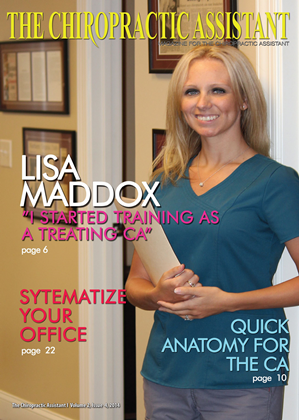A s a chiropractic assistant, keep your ears open when you are interacting with patients. Don't be afraid to speak boldly about what your doctor does and whatyou have seen happen in the practice. You are there to help educate patients and reinforce what your doctor is telling them. In this article, I am going to focus on the autonomic nervous system, also known as the visceral nervous system. The autonomic nervous system functions below the level of consciousness. For example, you don't have to think about how to increase or decrease your heart rate or breathing rate, constrict or dilate your pupils, or secrete saliva in your mouth when you take a bite of food. Your autonomic nervous system controls these functions in addition to many other organ-related functions. Nutritionally, there are certain minerals that can help support the normal function of the autonomic nervous system. During times of high or prolonged stress, your body requires more nutritional support to be able to combat that stress. If patients' diets are not high in fruits and vegetables, if they have weakened digestive systems, or if they are eating too much sugar, it is very easy for them to become deficient in these minerals. This can lead patients to becoming sympathetically or parasympatheti-cally dominant. This will upset the natural harmony of the autonomic nervous system, which can lead to health problems. Some food enzyme supplements can support patients' nutritional needs and speed up recovery. Here are a few common symptoms that let you know that a patient's autonomic nervous system could be out of balance: Type A personality Stiff, sore joints, especially after rest Problems with indigestion or constipation Muscle soreness and weakness Restlessness, hyperirritability, or restless legs at night Unresolved health problems By recommending nutritional support in patients' care plans, you can improve their clinical results and help to grow your practice. By asking great questions, you can keep patients engaged in the care plan. The more engaged that they are, then the more intelligent they become about their bodies and health, which means they can make better decisions, get well quicker, and stay well. You can ask questions such as, "Are you satisfied with how your body is healing?", and, "Are you satisfied with the time frame in which your body is healing?" If patients don't give you a "yes" without hesitation, then you might want to pursue that line of thought with them or have your doctor follow up with them. You can say, "Dr. Jones can do a two-minute exam to see if your body has a food enzyme deficiency. Would you be interested in a two-minute exam?" Your patients don't know what they don't know. If you have been following my last three articles, you now understand that and can help paint the bigger picture for them. For more information on food enzyme nutrition, chiropractors may call the Loomis Institute at 1-800-662-2630 to set up an account. See the Loomis Institute's ad to order the "REAL" Test Kit, which teaches chiropractors the screening exam mentioned in this article. Chiropractors have access to the Loomis Institute's director of clinical sciences, who is available to answer questions as they incorporate enzyme nutrition into practice. Dr. Keith Giaquinto has over 11 years of clinical experience as a (liiropractor and Internal Health Specialist. He frequently lectures to companies and groups in his community on topics of health and wellness. He has created a new patient lecture system for growing your practice through lecturing. You can contact him at www.YourDigestionDoctor.com
 View Full Issue
View Full Issue









